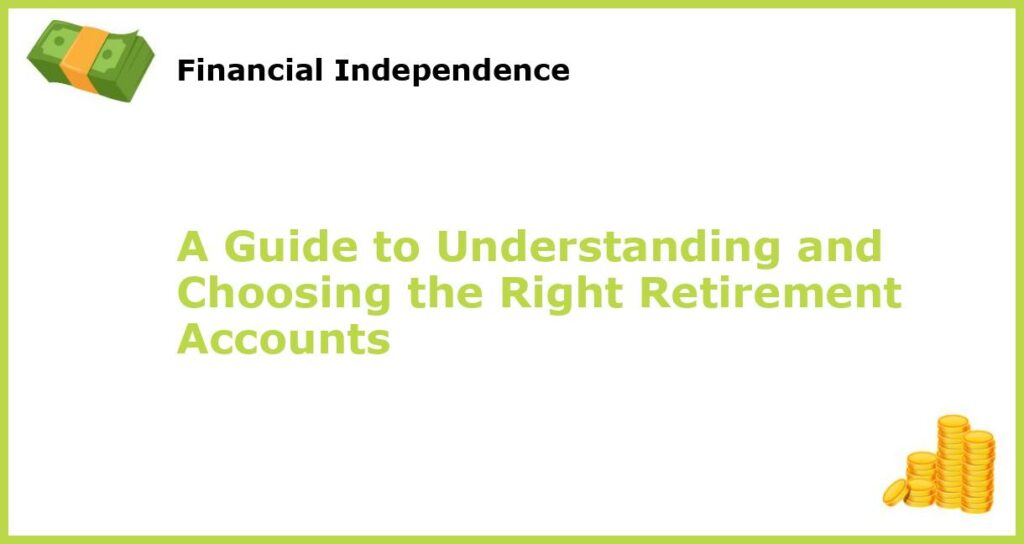Welcome to the ultimate guide to understanding and choosing the right retirement accounts. Retirement accounts are a vital part of your retirement planning, but with so many options out there, it can be overwhelming to choose the right one. In this article, we will elaborate on the top 10 things you need to know about retirement accounts to make the best decision for your retirement future.
1. Traditional vs Roth IRAs – What’s the Difference?

Choosing between a Traditional IRA and a Roth IRA is one of the first decisions you will need to make. A traditional IRA allows tax-deferred contributions, meaning you can take a tax break for your contributions right now, but you’ll have to pay taxes on your withdrawals during retirement. A Roth IRA, in contrast, offers tax-free withdrawals, but all contributions are taxed. Therefore, depending on your present and expected financial situation during retirement, you must make the best decision for your retirement goals. It’s also crucial to note that the eligibility rules differ for each IRA. For example, with Roth IRA, high-income earners may not be eligible to contribute to it.
2. The Ins and Outs of 401(k) Plans

401(k) plans are the most popular retirement account and can help you save more money for retirement. When choosing a 401(k), it’s essential to understand its vesting schedule, contribution limits, employer match, and fees. A vesting schedule is the length of time you must wait until you have earned employer matching contributions. Contribution limits set by the Internal Revenue Service determine how much you can contribute to your plan limit. It’s also crucial to take into account the employer match, which is free money that you get from your employer when you contribute to the plan. Lastly, understanding the fees you’ll pay can make a huge difference in the overall growth of your assets over time.
3. Don’t Overlook the Solo 401(k)

A Solo 401(k) is an ideal retirement account for freelancers, small business owners, and self-employed individuals. It allows you to contribute both as an employee and an employer, allowing you to save money for retirement. Thanks to this feature, you can make more significant contributions to your retirement savings, unlike traditional 401(k)s.
4. Consider a SEP Plan for Your Business

If you run a business that has a few employees or no employees, you may benefit from opening a Simplified Employee Pension (SEP) plan. SEP is a retirement account that allows employers to make tax-deductible contributions on behalf of the employees. It’s ideal for business owners, such as consultants or freelancers or those with irregular income or cash flow.
5. The Benefits of a Health Savings Account (HSA)

A Health Savings Account (HSA) is primarily created to save for healthcare expenses, but it can also be used as a retirement account. An HSA has numerous tax advantages, including tax-deductible contributions, tax-free growth and tax-free withdrawals, provided they are used for qualified medical expenses. When used as a retirement account, the money you save in an HSA can go toward healthcare expenses, and the account tax rules tend to change compared to a regular HSA.
6. Time is on Your Side with a Long-Term Care Account
People have started planning for long-term care expenses by saving in Long-term care accounts (LTC). With an LTC account, you can save specifically towards the costly long-term care expenses. In addition, some long-term care accounts offer a death benefit if the money is not used for cover costs related to long-term care.
7. The Pros and Cons of Annuities
Annuities are a contract that provides guaranteed income for a certain period, or for life, in return for an initial investment. While annuities can give you peace of mind, they can come with high fees and restrictions. They’re more appropriate for people with no other means of financial support in retirement, as they can provide a guaranteed stream of income for the rest of your life.
8. Don’t Forget about Social Security
Social Security is a government scheme that provides retirees with a steady source of income but it’s crucial to know how much you will receive and when you can initiate receiving benefits. For example, it is vital to consider whether to receive benefits early, which leads to a reduced monthly payment, or to wait until you reach full retirement age. It’s critical to integrate social security into your retirement plan as part of a diverse income stream.
9. Consider Working with a Financial Advisor
With many retirement accounts available and many choices to choose from, working with a financial advisor can be a valuable tool when choosing the most effective retirement account. Your financial advisor can also help you manage your retirement accounts and adjust them as necessary over time. A financial advisor can help you create a comprehensive retirement plan tailored to your specific goals and needs.
10. The Bottom Line
Choosing the right retirement account can be overwhelming, but understanding the available options and seeking advice from a financial advisor if necessary can help you make proper and well-informed decisions. The best option for you depends on your specific situation, risk tolerance, and goals. The right retirement account can help you achieve your retirement goals and financial well-being.







